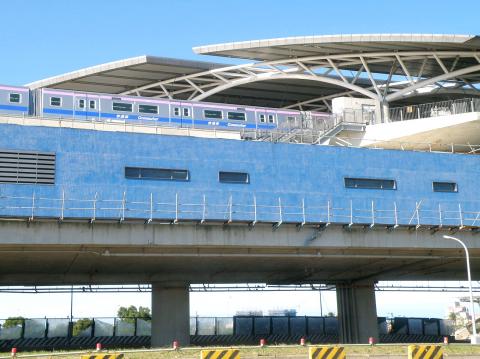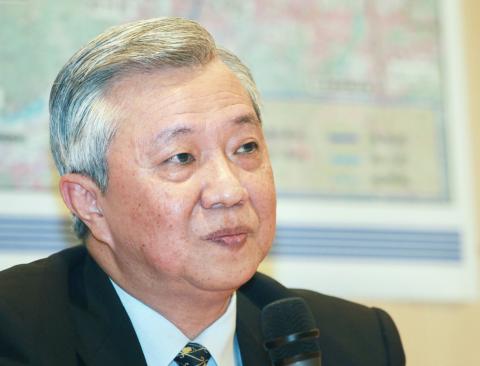Bureau of High Speed Rail Director-General Chu Shu (朱旭) yesterday resigned from his position after assuming responsibility for delays in the launch of the Airport Rail line between Taipei Taoyuan International Airport and Taipei.
Chu told a press conference that the bureau aimed to have the section between Sanchong (三重) and Jhongli (中壢) operational by the end of 2015.
Immediately after the press conference, the Ministry of Transportation and Communications (MOTC) issued a press release stating that MOTC Minister Yeh Kuang-shih (葉匡時) had accepted Chu’s resignation.

Photo: Taipei Times
The ministry said Chu had also applied for early retirement, which would take effect next month.
MOTC Deputy Minister Jack Hsu (許俊逸) has been assigned to oversee the operation of the bureau while the bureau’s deputy director-general Allen Hu (胡湘麟) will temporarily assume Chu’s position, the ministry said.
Chu said the bureau had originally planned to launch the Airport Rail in October. However, it estimated that construction might not meet the approved deadline due to disputes between Marubeni Corp, the contractor in charge of building the railway’s signaling system, and its subcontractor, London-based control and safety system manufacturer Invensys.

Photo: CNA
The bureau also ordered the complete replacement of electrical wires used in the signaling system after some were found to have cracks in their insulation.
Currently, 97.17 percent of the civil engineering construction of the Airport Rail has been completed. About 56 percent of the signaling system is complete.
Asked why it would take another two-and-a-half years to launch the Airport Rail, Chu said the contractor should finish installation of the signaling system by the end of this year or the beginning of next year. He said that the bureau would use next year to test the Airport Rail, adding that the signaling system and 13 other systems involved must be fully integrated to fulfill the requirements stated in the contract.
Taoyuan Metro Corp has been assigned to take over the line’s operation once the Airport Rail is completed and Chu said that the company would need time to prepare for the takeover. The company also needs to pass the final safety inspection by the Ministry of Transportation and Communications before it can start running services, he said.
Asked if the bureau would postpone the deadline again, Chu said that he could not make any promises.
“We can only strive to fulfill the mission,” he said.
According to Chu, the signaling system is being jointly constructed by Marubeni, Kawasaki and Hitachi. If Marubeni drops out, the other two contractors would take over, he said.
Marubeni reached an agreement with Invensys in March to continue the construction, he added.
Meanwhile, the bureau will fine Marubeni for violating the terms of its contract by failing to meet the deadline, with the contractor being asked to pay about NT$12 million (US$400,000) daily for each day it exceeds the deadline by. The penalty is capped at NT$2.5 billion. However, the bureau could seek further restitution from Marubeni for financial losses caused by the delayed launch of the Airport Rail.
The Japanese contractor could also face suspension of the right to bid for public constructions in Taiwan for one year, if the Public Construction Commission rules that it has committed a serious violation.
Chu said the bureau would continue to monitor progress by the contractor, which has submitted a plan to speed up construction of the signaling system. Should the bureau deem that the contractor has been ineffective in executing its plan to speed up construction, Chu said the contract with Marubeni could be terminated.
Chu said that the bureau did not know that Marubeni had violated the terms of the contract by outsourcing the signaling system to Invensys until the bureau received a letter from the subcontractor admitting that it was building the signaling system.
Marubeni also had disputes with another subcontractor for the railway construction in 2010. The subcontractor withheld the design plan for the railway construction and did not hand it over until it was ordered by a court to do so.

MORE VISITORS: The Tourism Administration said that it is seeing positive prospects in its efforts to expand the tourism market in North America and Europe Taiwan has been ranked as the cheapest place in the world to travel to this year, based on a list recommended by NerdWallet. The San Francisco-based personal finance company said that Taiwan topped the list of 16 nations it chose for budget travelers because US tourists do not need visas and travelers can easily have a good meal for less than US$10. A bus ride in Taipei costs just under US$0.50, while subway rides start at US$0.60, the firm said, adding that public transportation in Taiwan is easy to navigate. The firm also called Taiwan a “food lover’s paradise,” citing inexpensive breakfast stalls

TRADE: A mandatory declaration of origin for manufactured goods bound for the US is to take effect on May 7 to block China from exploiting Taiwan’s trade channels All products manufactured in Taiwan and exported to the US must include a signed declaration of origin starting on May 7, the Bureau of Foreign Trade announced yesterday. US President Donald Trump on April 2 imposed a 32 percent tariff on imports from Taiwan, but one week later announced a 90-day pause on its implementation. However, a universal 10 percent tariff was immediately applied to most imports from around the world. On April 12, the Trump administration further exempted computers, smartphones and semiconductors from the new tariffs. In response, President William Lai’s (賴清德) administration has introduced a series of countermeasures to support affected

CROSS-STRAIT: The vast majority of Taiwanese support maintaining the ‘status quo,’ while concern is rising about Beijing’s influence operations More than eight out of 10 Taiwanese reject Beijing’s “one country, two systems” framework for cross-strait relations, according to a survey released by the Mainland Affairs Council (MAC) on Thursday. The MAC’s latest quarterly survey found that 84.4 percent of respondents opposed Beijing’s “one country, two systems” formula for handling cross-strait relations — a figure consistent with past polling. Over the past three years, opposition to the framework has remained high, ranging from a low of 83.6 percent in April 2023 to a peak of 89.6 percent in April last year. In the most recent poll, 82.5 percent also rejected China’s

PLUGGING HOLES: The amendments would bring the legislation in line with systems found in other countries such as Japan and the US, Legislator Chen Kuan-ting said Democratic Progressive Party (DPP) Legislator Chen Kuan-ting (陳冠廷) has proposed amending national security legislation amid a spate of espionage cases. Potential gaps in security vetting procedures for personnel with access to sensitive information prompted him to propose the amendments, which would introduce changes to Article 14 of the Classified National Security Information Protection Act (國家機密保護法), Chen said yesterday. The proposal, which aims to enhance interagency vetting procedures and reduce the risk of classified information leaks, would establish a comprehensive security clearance system in Taiwan, he said. The amendment would require character and loyalty checks for civil servants and intelligence personnel prior to